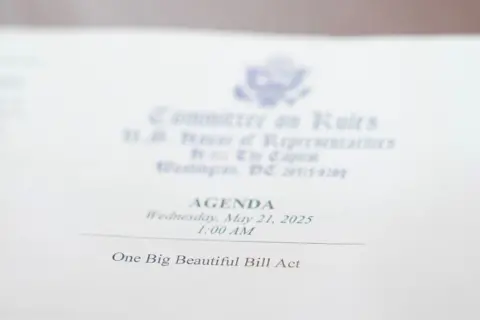Trump meets Republican hard-liners in hopes of moving tax bill forward
 EPA
EPAPresident Donald Trump and House Republicans continued to negotiate a far-reaching tax and spending bill on Wednesday, holding discussions at the White House ahead of a potential vote.
Trump and his staff spent several hours with members of the House Freedom Caucus, who have refused to support a bill they say does not go far enough in cutting spending.
Many of Trump's top priorities are in the legislation: extending tax cuts passed in 2017, eliminating taxes on tips, spending more on defence and border security, and cutting government health care programmes.
The Congressional Budget Office (CBO) estimates the bill would add about $2.3tn (£1.7tn) to the US national debt over the next 10 years.
Trump campaigned on promises to reduce the US budget debt - the cumulative gap between the government's tax revenue and its spending - which currently stands at around $36.2tn (£27tn).
Negotiators worked through the night on Tuesday, including a meeting of a House committee which began at 01:00 local time (05:00 GMT) Wednesday.
Because Republicans hold a narrow majority in the House and Democrats uniformly oppose the legislation, Trump can only risk losing a handful of votes from his own party. He and congressional allies are also under the pressure of a self-imposed deadline to get the bill passed by the end of the month, which is now 10 days away.
After it wins approval in the House, the bill will head to the Republican-led Senate, which could make its own changes.
After leaving the White House negotiations on Wednesday, Speaker Mike Johnson said the full House could vote on the bill Wednesday night or Thursday morning, according to Politico.
The president has called his proposal a "big, beautiful, bill" – the measure is now officially known as the "One Big Beautiful Bill Act" – but has faced opposition from members of the House Freedom Caucus who want additional spending cuts.
At the same time, several Republicans representing districts in Democratic-leaning states want bigger tax cuts for their voters - to be achieved by increasing credits those voters receive for paying state taxes at relatively high rates.
Trump and Johnson are trying win over both dissenting factions, which could prove to be a delicate balance.
Kentucky's Thomas Massie, one of the Republican holdouts in the House, took to X to complain about the closed negotiations. Trump earlier this week labelled him a "grandstander".
"Major provisions of the big beautiful bill are still being negotiated and written, yet we are being told we will vote on it today," Massie wrote. "Shouldn't we take more than a few hours to read a bill this big and this consequential?"
Trump also visited Capitol Hill on Tuesday to push for the bill, meeting with Republicans and urging both the budget hawks and tax-cut proponents to accept the bill on the table.
But it was unclear if he managed to swing many votes.
Democrats, saying the bill would benefit the rich and unfairly punish lower-income Americans, have made it clear in committee hearings and on social media that they will only vote against it.
The White House has dismissed worries about the ballooning US debt, arguing that tax cuts will stimulate the economy. Trump also has said his separate programme of tariffs will bring additional revenue to the federal government. However, most economists and experts agree with the non-partisan CBO that the bill will add to the debt.
The bill's supporters have remained bullish about its eventual prospects.
"Failure is not an option in getting this done," said Republican Jason Smith of Missouri.
 Reuters
ReutersA separate CBO analysis reported that the bill would hurt the poorest Americans while benefiting the top 10% of earners.
"We're going to ask Americans to finance tax cuts for billionaires on the national debt - on the credit card," said Democratic Representative Gwen Moore of Wisconsin.
The tight margin between the parties in the House means Trump and his allies need near-unanimous support from Republicans to pass the measure.
House Speaker Mike Johnson has said he wants the bill passed by Monday 26 May, the Memorial Day holiday in the US.
Although it is possible the bill could come up in the full House on Wednesday or Thursday, it is unlikely that the Speaker will risk a vote unless he is confident that the measure will pass.
Even if the bill passes the House, it is a long way from becoming law. The legislation would move to the Senate - and then be subjected to a likely negotiation process to reconcile two versions of the bill - before it can be sent to the president for his signature.
